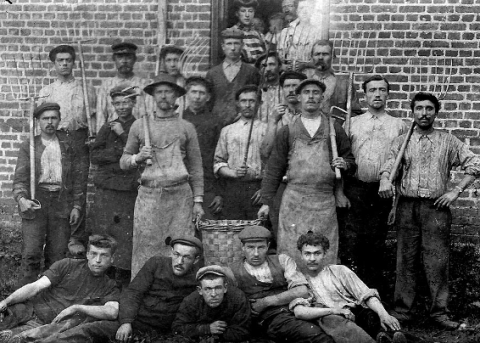
This Working Group was formerly known as "Free and Unfree Labour".
Mission
The relationship between coercion and labour is of critical importance in the context of our understanding of historical societies, whilst also reflecting contemporary global economic developments. The ELHN Working Group Labour and Coercion aims to further the study of coerced labour by bringing together scholars who study all kinds of labour relations, focusing on the aspects of coercion they entail. Examples of such relations include chattel slavery, wage labour, debt bondage, convict labour, indentured work, sharecropping, household labour and military impressment. By addressing this research question, it becomes possible to address and conceptualise not only the differences and commonalities between different types of labour, but also their connections throughout history.
The present moment is characterised by a period of reflection on the manner in which diverse coercive dynamics are constructed through the relationship between the materiality of work, its social representation (i.e. the manner in which coercion is represented, perceived and discussed), and workers' self-perception (i.e. the manner in which workers perceive themselves in relation to their work). One of the objectives of the working group is to undertake empirical studies on the subject, thereby continuing the work of deconstructing the traditional categories and models associated with the study of labour history. Furthermore, there is a desire to discuss the tensions between empirical cases and theoretical studies more thoroughly.
Activities
From October 2019 to March 2024, the working group was part of the EU COST Action Worlds of Related Coercions in WorK (WORCK). The origins of this initiative can be traced back to the endeavours of the ELHN Working Group on Labour and Coercion. The financial support provided by the EU enabled the working group to expand its membership, establish more active connections with interested scholars, and enhance the scope of its activities. The objective of the collaboration was to provide a radical historicist analysis of labour coercion, with the aim of achieving a more profound comprehension of how coercion has influenced lives and societies across various time periods and geographic regions.
Building on this experience, the Labour and Coercion working group is currently engaged in a reflective process concerning the complex relationship between established norms and actual practices concerning the role of coercion in work relations. Coercion continues to be utilised as a lens to explore social relations and overcome conventional analytical tools, with a focus on historicising coercion. The inquiry delves into tensions between coercive material practices and their social representation (i.e. the manner in which coercion is represented, perceived and discussed), as well as workers' processes of subjectivation (i.e. how workers perceive themselves in relation to their work).The group is also interested in developing a comparison of empirical studies on the subject, with the aim of pursuing and deepening a theoretical discussion that originates from our sources.
Since the end of the COST Action WORCK, the WG Labour and coercion have set up a new mailing list.
If you are interested in participating in the group and want to be updated about our upcoming activities, please sign up for our new mailing list here.
Contact
To join the working group Labour and Coercion, please contact the working group coordinators:
- Johan Heinsen, heinsen@dps.aau.dk
- Olimpia Capitano, capitanoolimpia@gmail.com
- Teresa Petrik, teresa.petrik@univie.ac.at
- Vilhelm Vilhelmsson (written with two s), vilhelmv@hi.is
External links
Please find the list of PDF newsletters of the working group attached below.
[last updated 9 April 2025]
